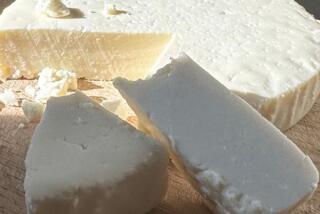Pediatricians advise pregnant women, children against drinking raw milk
The American Academy of Pediatrics on Monday warned that pregnant women and children should not drink raw milk and said it supports a nationwide ban on the sale of raw milk because of the danger of bacterial illnesses.
The group’s statement said it supports federal health authorities “in endorsing the consumption of only pasteurized milk and milk products for pregnant women, infants and children.”
The academy also “endorses a ban on the sale of raw or unpasteurized milk and milk products throughout the United States, including the sale of certain raw milk cheeses, such as fresh cheese, soft cheeses and soft-ripened cheeses.”
California is among 30 states that allow the sale of raw milk and one of the few that allows it in grocery stores. The U.S. Food and Drug Administration prohibits the interstate shipment of raw milk for human consumption, though it allows transport of some clearly labeled raw cheeses.
Advocates say raw milk is delicious and provides health benefits, including protection against asthma and lactose intolerance. And when the animals are raised properly and the milk is treated carefully, they say, raw milk poses little danger to human health.
Last week, health officials in Minnesota warned that raw milk could be making more people sick than previously recognized, based on a 10-year study. They estimated that more than 17% of the state’s residents who drank raw milk got sick.
Raw milk has long been identified as a source of food-borne-illness outbreaks, but it is also responsible for uncounted sporadic illnesses, the Minnesota officials said.
And, in another study, scientists who looked at hundreds of samples found that organic whole milk offered more of the fatty acids good for the heart than conventional milk. “We were quite surprised to see the magnitude of difference in milk from organic farms,” said Charles Benbrook, lead author of that study and a program leader at the Center for Sustaining Agriculture and Natural Resources at Washington State University.
Raw milk from cows, sheep and goats is a source of pathogens such as listeria, salmonella and E. coli – which can cause serious, even fatal, illness, the pediatricians’ policy statement said. And it contends that the benefits of raw milk “have not been clearly demonstrated in evidence-based studies” and do not outweigh the risks.
That assessment is confusing, said Mark McAfee, head of a raw milk dairy with products sold in 625 stores. “I could not disagree with them more profoundly. And it’s based on science,” he said.
What he sells “is not the raw milk we saw 50 to 75 to 100 years ago,” he said. Raw milk that’s regulated by state officials and produced under strict standards is safe and beneficial to people, he said.
Pasteurization, introduced in the U.S. in the 1920s, kills bacteria by heating milk. Before that time, the pediatricians’ statement said, raw dairy products were responsible for hundreds of outbreaks of infection.
“Pasteurized milk and milk products are extraordinarily healthy, nutritious and safe for children,” said Dr. Mary Glode, a co-author of the policy statement. The academy’s statement supports the position of the FDA, the American Medical Assn. and others.
Maureen Bligh, a registered dietitian nutritionist, said she agreed “wholeheartedly” with the American Academy of Pediatrics stand. “They instituted pasteurization for a reason – to ensure safety for the entire population, and it’s especially important for children and anyone else who is vulnerable.”
To her, the risks are not worth any benefits that advocates say come from raw milk.
The pediatricians estimate that 1% to 3% of dairy products consumed in the U.S. are not pasteurized. From 1998 to 2009, that led to 1,837 illnesses, two resulting in death. The popularity of raw milk products, including soft cheeses, has been on the rise.
“We have no scientific evidence that consuming raw milk provides any advantages of pasteurized milk and milk products,” Dr. Yvonne Maldonado, lead author of the policy statement, a professor of pediatrics at Stanford University School of Medicine and an infectious-disease expert, said in a statement. “But relative to the amount of raw milk products on the market, we do see a disproportionately large number of disease and illnesses from raw milk.”
McAfee does not dispute that some raw milk is risky. And that, he said, is why all states need regulations. In Minnesota, for example, raw milk is illegal, so there’s no way to make sure it gets processed safely. In California, he said, there have been very few cases of illness. He said he’s not surprised there are infections in places where raw milk is unregulated because “it’s a black market, a free-for-all.”
Infection from raw milk can occur through contact with animal feces, through organisms on the hide, or through infections the animals have.
McAfee also sees business motivations. He said milk processors oppose the sale of raw milk because they are in the business of processing it.
Also:
Who to blame for the cockroach
Dad’s diet and baby’s genetic fate
Hard-wired brains lead to differences
mary.macVean@latimes.com







